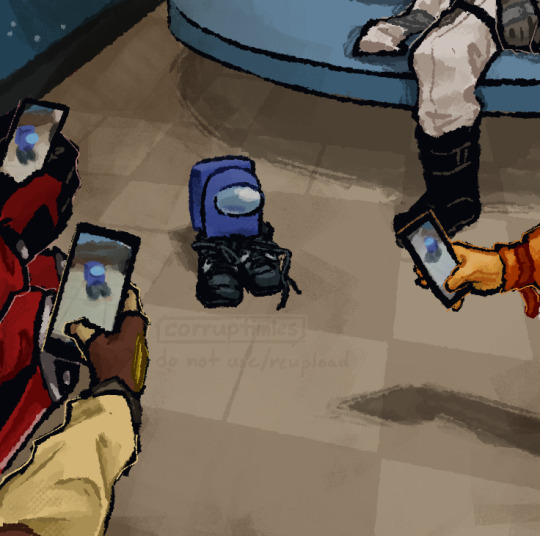They • Them Virtual Musician • Computerized Artist • Cyber Clown • Digital Mime
Don't wanna be here? Send us removal request.
Text

baby pictures
original photo:

sorry I forgot to add it after posting as I needed to restart my computer when all my windows started flickering and froze help lol
1K notes
·
View notes
Text
"like a boss" by lonely island was released ten thousand years ago when mammoths still roamed the big wide world. feel old yet?
22K notes
·
View notes
Text
[“Accountability looks like healthy families and communities. Accountability does not begin after any abuse has been perpetrated but rather before anything happens. For example, I remember looking on in awe a few years ago as a friend spoke to her toddler daughter about not letting people touch her unwillingly. More to the point, I was taken aback by how deliberate she was using the word “vagina.” Later, when I asked her about this exchange with her daughter, she told me that being frank in reference to her child’s body was one of steps she was taking toward stemming the long history of child sexual abuse that had long infested her family. My partner and I are similarly direct with our children, making sure to refer to their body parts by their correct names. We refrain from indirect or infantilizing references to their bodies. For example, we do not tell the boys to clean their “wee wees” in the shower. Instead, it is “wash your penis.” By modeling for them that we are not afraid of discussing their bodies, we are empowering them with templates to do the same. Therefore, in treating them as sole proprietors of their bodies, we are helping frame their interactions with others around their bodies so that they may be better equipped to fend off would-be abusers.
That said, parenting strategies aren’t foolproof, nor does the existence of sexual abusers indicate familial failings. The intersection of personal and social responsibility in this matter is particularly fraught in large part because there is a greater struggle to effectively articulate and acknowledge that sexual predators are in our midst and, in some cases, in our own homes. And not unlike other areas of the criminal justice system, what constitutes a transgression worthy of being included in a sex offenders registry is wildly inconsistent. As a staunch opponent of mass incarceration, I loathe advocating for imprisonment in most instances, and sex crimes are no different. Therefore, a multifaceted counseling strategy is, in my view, the strongest resource to curbing child sexual abuse. As part of that strategy, I would include quality education about sex and general health because schools and curricula shape individual and communal behavior.
Again, it is important for young people to learn as early as possible that sex is not something to be ashamed of or to be kept secret. Moreover, incorporating teaching about mental and emotional health in schools will help every student for life beyond school, preparing them for how to process and articulate what is happening in their lives and, more specifically, what is happening to them. Expanding knowledge about healthy practices will not only lessen the likelihood that individuals might commit crimes; it may also increase awareness about unacceptable behavior for young people.
Additionally, removing the threat of prison is also likely to bolster the odds that victims and their families come forward and challenge abusers. The prospect of losing a relative to incarceration, especially when that person is possibly a breadwinner or contributes to the household in another significant capacity, is daunting for many victims and their families.
Lastly, as presently constituted, most prisons and jails in this country do not have the staff and other resources to effectively rehabilitate criminals. American prisons, for the most part, are devoid of counseling services capable of providing ongoing support for inmates. Reentry programs also lack the necessary staffing to facilitate mediation between assailants and their victims, a service that is vitally needed, given that many victims were likely abused by either a relative or another person close to their family.
In order for this to work, restorative and transformative justice systems must be created with the priority of protecting victims, helping make them whole after they have been abused, and creating safeguards that will diminish the likelihood that assailants can continue abusing others. If restorative and transformative justice processes can ensure that victims feel comfortable coming forward, they will in turn increase the likelihood that assailants receive necessary counseling, enabling them to see and acknowledge the harm they have caused by their actions and helping to prevent them from recommitting these forms of violence.”]
ferentz lafargue, from on moving forward, from love WITH accountability: digging up the roots of child sexual abuse, edited by aishah shahidah simmons, 2019
57 notes
·
View notes
Text



Giving my stupid chud oligarch the reddit key
4K notes
·
View notes
Text
tonight im making sausage stir fry because i ran out of everything else
172 notes
·
View notes
Text
everybody was normal fighting~ *non-racist riff*
37K notes
·
View notes
Text
In contrast with professional drag queens, who were only playing at being women onstage, [Esther] Newton learned that the very bottom of the gay social hierarchy was the province of street queens. In almost total contrast to professional queens, street queens were "the underclass of the gay world." Although they embraced effeminacy, too, they did so in the wrong place and for the wrong reason: in public and outside of professional work. As a result, Newton explained, the street queens "are never off stage. Their way of life is collective, illegal, and immediate." Because they didn't get paid to be feminine and were locked out of even the most menial of nightlife jobs, Newton observed that their lives were perceived to revolve around "confrontation, prostitution, and drug 'highs'." Even in a gay underworld where everyone was marked as deviant, it was the sincere street queens who tried to live as women who were punished most for what was celebrated-and paid-as an act onstage. When stage queens lost their jobs, they were often socially excluded like trans women. Newton explained that when she returned to Kansas City one night during her fieldwork, she learned that two poor queens she had met had recently lost their jobs as impersonators. Since then, they had become "indistinguishable from street fairies," growing out their hair long and wearing makeup in public-even "passing" as girls in certain situations," in addition to earning a reputation for taking pills. They were now treated harshly by everyone in the local scene. Most people wouldn't even speak to them in public. Professional drag queens who didn't live as women still had to avoid being seen as too "transy" in their style and demeanor. One professional queen that Newton interviewed explained why: it was dangerous to be transy because it reinforced the stigma of effeminacy without the safety of being onstage. "I think what you do in your bed is your business," he told Newton, echoing a middle-class understanding of gay privacy, "[but] what you do on the street is everybody's business."
The first street queen who appears in Mother Camp is named Lola, a young Black trans girl who is "becoming a woman,' as they say'." Newton met Lola at her dingy Kansas City apartment, where she lived with Tiger, a young gay man, and Godiva, a somewhat more respectable queen. What made Godiva more respectable than Lola wasn't just a lack of hormonal transition. It was that Godiva could work as a female impersonator because she wasn't trying to sincerely live as a woman. Lola, on the other hand, was permanently out of work because being Black and trans made her unhireable, including in female impersonation. When Newton entered their apartment, which had virtually no furniture, she found Lola lying on "a rumpled-up mattress on the floor" and entertaining three "very rough-looking young men." These kinds of apartments, wrote Newton, "are not 'homes.' They are places to come in off the street." The extremely poor trans women who lived as street queens, like Lola, "literally live outside the law," Newton explained. Violence and assault were their everyday experiences, drugs were omnipresent, and sex work was about the only work they could do. Even if they didn't have "homes," street queens "do live in the police system."
As a result of being policed and ostracized by their own gay peers, Newton felt that street queens were "dedicated to "staying out of it" as a way of life. "From their perspective, all of respectable society seems square, distant, and hypocritical. From their 'place' at the very bottom of the moral and status structure, they are in a strategic position to experience the numerous discrepancies between the ideals of American culture and the realities." Yet, however withdrawn or strung out they were perceived to be, the street queens were hardly afraid to act. On the contrary, they were regarded by many as the bravest and most combative in the gay world. In the summer of 1966, street queens in San Francisco fought back at Compton's Cafeteria, an all-night venue popular with sex workers and other poor gay people. After management had called the police on a table that was hanging out for hours ordering nothing but coffee, an officer grabbed the arm of one street queen. As the historian Susan Stryker recounts, that queen threw her coffee in the police officer's face, "and a melee erupted." As the queens led the patrons in throwing everything on their tables at the cops-who called for backup-a full-blown riot erupted onto the street. The queens beat the police with their purses "and kicked them with their high-heeled shoes." A similar incident was documented in 1959, when drag queens fought back against the police at Cooper's Donuts in Los Angeles by throwing donuts-and punches. How many more, unrecorded, times street queens fought back is anyone's guess. The most famous event came in 1969, when street queens led the Stonewall rebellion in New York City. Newton shares in Mother Camp that she wasn't surprised to learn it was the street queens who carried Stonewall. "Street fairies," she wrote, "have nothing to lose."
Jules Gill-Peterson, A Short History of Trans Misogyny
6K notes
·
View notes
Text
to the student who used chat gpt on his paper
i know
my simple miracle
that it’s hard —
the living of it —
but
you should
have been generating
overwatch porn
instead
1K notes
·
View notes
Text
any kind of piracy makes my heart so happy i saw a video about font piracy and i dont know how that works but the birds are chirping louder and the sun is shining brighter knowing that there are brave warriors working on thagt
505 notes
·
View notes
Text
you: suck my dick me, an intellectual: inhale my richard
625K notes
·
View notes






